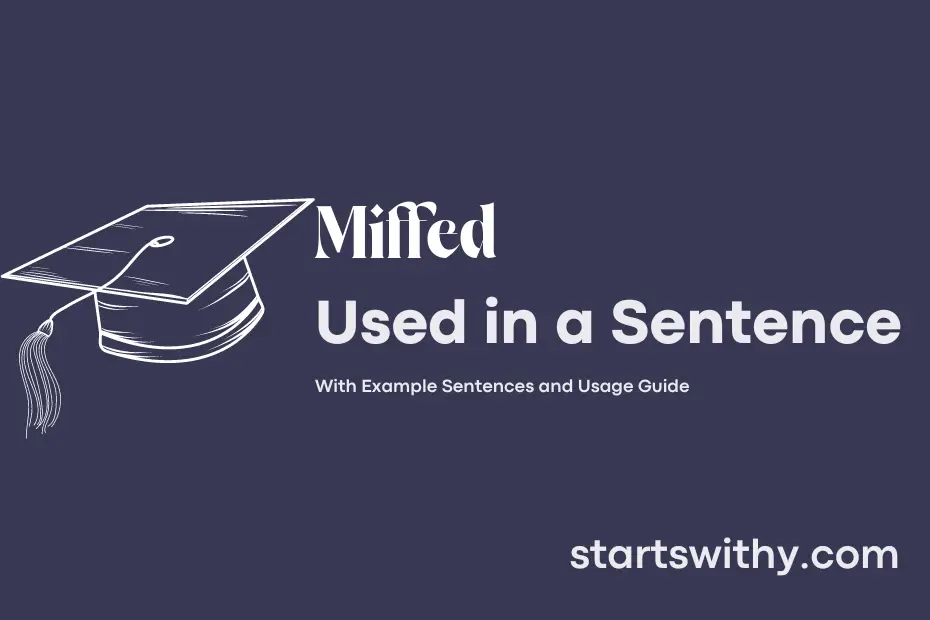Have you ever felt slightly annoyed or offended? That feeling of being miffed is a common emotion that many of us experience from time to time. Miffed is used to describe a state of slight irritation or displeasure.
When someone feels miffed, they are typically feeling put out or disgruntled about something that has happened. It’s a mild form of being bothered, often arising from a situation that feels unfair or frustrating.
7 Examples Of Miffed Used In a Sentence For Kids
- I was miffed when my friend took my toy without asking.
- She felt miffed when someone skipped her in line.
- The cat looked miffed when I accidentally stepped on its tail.
- He was miffed when his favorite cartoon was not on TV.
- I got miffed when my brother ate the last cookie.
- She was miffed when her sister didn’t share the chocolate.
- He seemed miffed when his kite got stuck in a tree.
14 Sentences with Miffed Examples
- Our professor cancelled the last-minute study session, leaving us all * miffed * about our upcoming exams.
- I was * miffed * when the canteen ran out of my favorite snack before I had a chance to buy it.
- My roommate was * miffed * when I accidentally used up all of her shampoo without asking.
- I felt * miffed * when our group project partner didn’t show up for our meeting, leaving us to do all the work.
- I was * miffed * when the library closed early, preventing me from finishing my research paper on time.
- My friend was * miffed * when the college wifi was down during our online lecture.
- I was * miffed * when the basketball court was closed for maintenance, ruining our plans for a game.
- My classmates were * miffed * when the cafeteria served bland food for the third day in a row.
- I was * miffed * when the printer in the computer lab ran out of ink right before I needed to print my assignment.
- My group of friends was * miffed * when our favorite hangout spot was closed for a private event.
- I was * miffed * when the college bookstore didn’t have the textbook I needed in stock.
- My professor was * miffed * when only a few students showed up for the guest lecture he had organized.
- I was * miffed * when the college administration announced a sudden change in the exam schedule.
- My classmates were * miffed * when the scheduled field trip got cancelled due to bad weather.
How To Use Miffed in Sentences?
To use the word “Miffed” in a sentence, you can say, “I was miffed when my friend canceled our plans last minute.” In this sentence, “miffed” is used to describe a feeling of slight annoyance or irritation.
Here are some tips on how to effectively incorporate the word “miffed” into your writing:
1. Context: Make sure the situation you are describing is one where someone is annoyed, displeased, or slightly offended. This will help convey the correct meaning of “miffed.”
-
Tone: Consider the tone of your sentence. Since “miffed” is a more informal term, it pairs well with casual or conversational writing.
-
Placement: You can place the word “miffed” at the beginning, middle, or end of a sentence. Just ensure it flows naturally within the context of your sentence.
-
Alternative Words: If you want to avoid repeating “miffed” multiple times in your writing, you can use synonyms such as annoyed, irritated, disgruntled, or vexed.
-
Practice: To become more comfortable using “miffed,” try incorporating it into different sentences or scenarios. This will help you remember the word and its meaning.
Remember, using “miffed” adds a touch of color and specificity to your writing, so don’t be afraid to experiment with it in various contexts.
Conclusion
In conclusion, the use of “miffed” in sentences indicates a feeling of annoyance, irritation, or slight anger. It represents a sense of displeasure or offense towards a particular situation or person. For example, “She was miffed when her request was denied” conveys a clear sense of being upset due to a refusal.
Understanding the context in which “miffed” is used can help to accurately interpret the underlying emotions and reactions in a conversation or written text. By recognizing the nuances of this word in various sentences, one can better navigate interactions and address any sources of frustration or discontent effectively.



